Likes & Dislikes ESL Games, Activities & Worksheets
Find Someone Who...

ESL Favourites Activity - Speaking: Asking and Answering Questions, Controlled and Freer Practice
In this free favourites 'Find Someone Who' activity, students write about their favourite things and then ask and answer questions to find classmates who have the same favourites. Students begin...
Food Likes and Dislikes
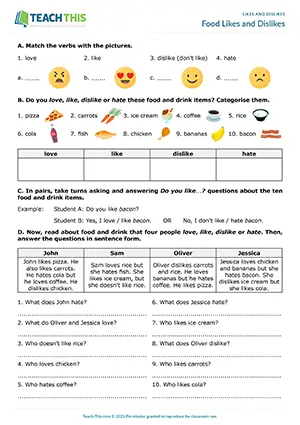
ESL Likes and Dislikes Worksheet - Vocabulary, Reading and Writing Exercises: Matching, Answering Questions, Writing Sentences - Speaking Activity
In this comprehensive likes and dislikes worksheet, students learn and practice talking about food and drink using love, like, dislike and hate. Students begin by...
My Favourites

ESL Favourites Activity - Vocabulary and Speaking: Sentence Completion, Asking and Answering Questions - Pair Work
In this useful favourites speaking activity, students complete sentences about their favourite things and then ask questions to a partner to find out about their favourites. First, students complete...
Let Me Guess
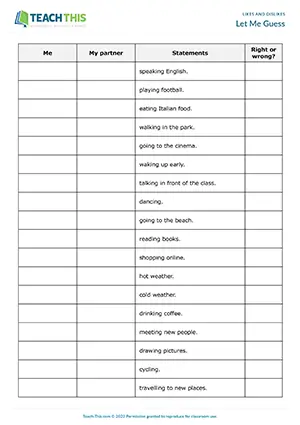
ESL Likes and Dislikes Game - Grammar and Speaking: Sentence Completion, Guessing, Asking and Answering Questions - Pair Work
This engaging likes and dislikes guessing game helps students practice expressing likes and dislikes in positive and negative statements and asking 'Do you like...?' questions. First, students...
Match my Answer
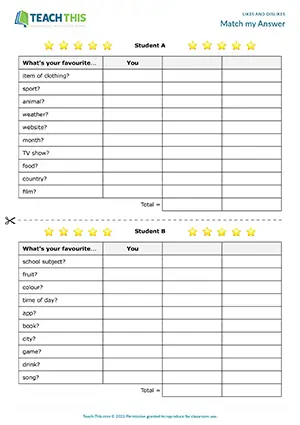
ESL Favourites Game - Speaking: Asking and Answering Questions, Controlled and Freer Practice - Pair Work
In this enjoyable expressing favourites game, students ask and answer questions about their favourite things and score points for matching answers. First, students answer questions about their favourite things...
My Favourite Person

ESL Favourite Person Worksheet - Drawing and Writing Activity: Gap-fill, Sentence Completion
In this rewarding favourites worksheet, students draw and write about their favourite person. Students begin by drawing a picture of their favourite person in a box. Students then complete sentences...
Like it or Leave it
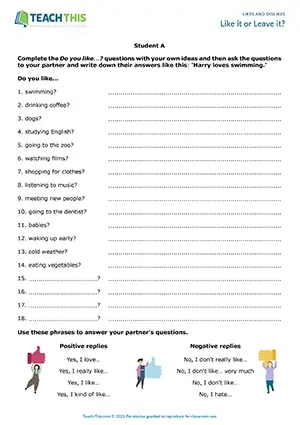
ESL Do You Like Activity - Speaking: Asking and Answering Questions, Writing Sentences - Pair Work
In this free likes and dislikes speaking activity, students ask 'Do you like...?' questions and reply with degrees of feeling. First, in pairs, students take turns asking 'Do you like...?' questions to their partner...
Likes and Dislikes Survey

ESL Likes and Dislikes Activity - Speaking: Sentence Completion, Asking and Answering Questions, Writing Sentences, Controlled and Freer Practice
In this insightful likes and dislikes speaking activity, students conduct a class survey about their feelings towards different things. First, students complete...
Was it you?

ESL Likes and Dislikes Game - Writing and Speaking: Writing Sentences, Asking and Answering Questions - Group Work
In this productive likes and dislikes game, students guess favourites, likes and dislikes of other students and use past simple yes/no questions to check their answers. In groups, students complete two...
Broken Sentences
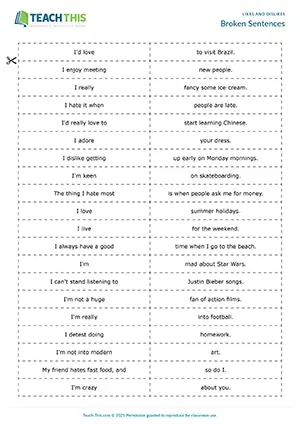
ESL Likes and Dislikes Game - Vocabulary and Grammar: Matching - Pair Work
In this handy likes and dislikes game, students match sentence halves together to practice various phrases that express likes and dislikes. In pairs, students have ten minutes to match sentence halves together to form 20 sentences that express likes...
Cupid's Dating Agency
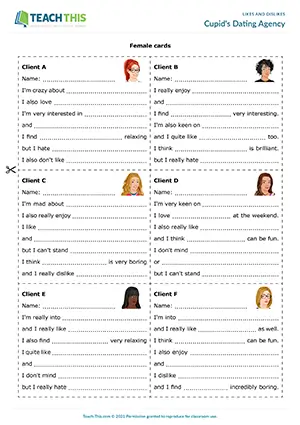
ESL Likes and Dislikes Activity - Speaking: Gap-fill, Guided Discussion, Matching, Communicative Practice - Pair and Group Work
In this light-hearted likes and dislikes activity, students create dating profiles and then match people together according to their likes and dislikes. First, in pairs...
Do you like...?

ESL Do You Like Activity - Speaking and Writing: Asking and Answering Questions, Writing Sentences, Freer Practice - Pair Work
This useful 'Do you like...?' questions activity helps students practice various phrases for expressing likes and dislikes. First, in pairs, students take turns...
I Love Charades

ESL Likes and Dislikes Game - Vocabulary and Speaking: Miming, Guessing, Forming Sentences
In this entertaining likes and dislikes game, students play Charades by miming and guessing sentences that use different phrases for expressing likes and dislikes. A player from Team A comes to the front...
Likes and Dislikes Board Game
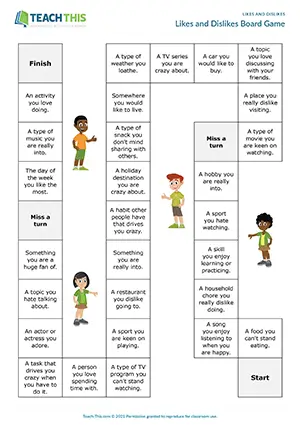
ESL Likes and Dislikes Board Game - Speaking: Impromptu Speech, Communicative Practice - Group Work
In this fun likes and dislikes board game, students talk about their likes and dislikes for 30 seconds. In groups, students take turns rolling the dice and moving their counter along the board. When a student...
Stop Bothering Me!

ESL Expressions of Irritation Activity - Speaking: Asking and Answering Questions, Controlled and Freer Practice - Pair Work
In this intriguing dislikes speaking activity, students answer questions using common expressions of irritation and non-irritation. First, in pairs, students take turns asking 'Does it bother you when...?'...
Tell Me What You Think!
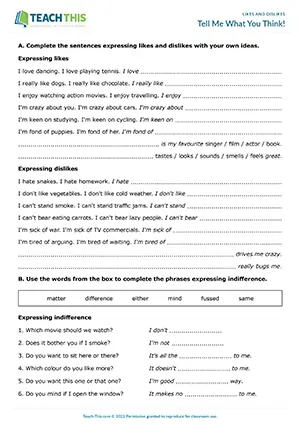
ESL Likes and Dislikes Activity - Vocabulary, Writing and Speaking: Sentence Completion, Gap-Fill, Matching, Preparing and Delivering a Dialogue, Freer Practice - Pair Work
In this free likes and likes worksheet, students practice phrases to express likes, dislikes and indifference. First, students complete sentences expressing...
Who is it?

ESL Likes and Dislikes Game - Vocabulary and Reading: Sentence Completion, Guessing - Pair Work
In this creative likes and dislikes game, students complete descriptions about their likes, dislikes and interests and then guess who wrote other descriptions. First, students complete sentences...
Did you write this?

ESL Likes and Dislikes Game - Speaking: Sentence Completion, Asking and Answering Questions, Freer Practice
In this memorable likes and dislikes game, students practice phrases to express likes and dislikes by completing sentences and finding out who wrote other sentences. In groups, students complete like and...
Talk for a Minute

ESL Likes and Dislikes Game - Speaking: Impromptu Speech, Communicative Practice - Group Work
Here is a fun likes and dislikes game to help your students practice talking about their attitudes towards different things. In competing teams of two, students take turns picking up a card and...
Here's what our members are saying...
